
Audencia's Alumni Magazine
#22 - January 2023 - 22#
New consumer trends
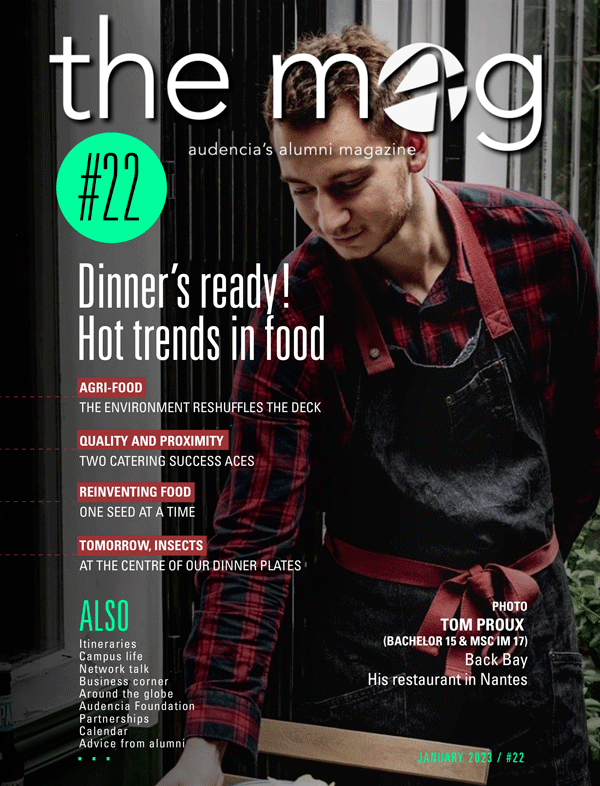
“Recent health and geopolitical events are a stark reminder of just how critical food safety remains for our societies.
Today, consumers want to easily source wholesome, tasty food that is respectful both to the environment and the producers. New consumer patterns are emerging: vegetable protein products or cereals with a modern twist, local produce, online purchases or else food bought directly from the producers, etc.
As Audencia is located in agri-food territory, in 2014 the school made a perfectly logical choice to offer an MSc / Master of Science in Food and Agribusiness Management (FAM). This international programme aims to train up professionals for the agri-food industry of tomorrow, helping them better adapt to emerging food trends, in both a responsible and innovative way.
To reinforce the course content, Audencia’s agri-food research centre is working on consumer behaviour with regard to food transition (including “ugly” fruit and vegetables, local produce, “without”, loose, or featuring eco-labelling).
In this edition of The Mag, Thierry Blandinières (GE 83) CEO of InVivo fills us in on his vision for the future of food. Alumni share their entrepreneurial adventures in healthy and freshly prepared dining experiences, as well as alternative proteins. We’ll give you the lowdown on the place given to responsible food at GAÏA. Finally, two graduates of our MSc FAM will also be sharing their professional experience with us.
Have an enjoyable read!”

Corinne Lamour, Academic Director of MSc FAM
Agri-food: the environment reshuffles the deck
.png)
In these times of crises in health, geopolitics and the climate, Thierry Blandinières (GE 83) CEO of InVivo, the leading French agricultural cooperative group, takes stock of the changes being observed in consumption and the agri-food industry.
How has the agri-food sector weathered the health crisis?
While there was a serious question mark as to whether general shortages would occur, French agriculture and the agri-food industry at large have proved they have what it takes to get through a global health crisis. A few years back, agri-bashing was on the rise. The future seemed to be in the hands of smallholder farmers, short food supply chains and organic production. The health crisis helped the general public in becoming aware that this, although part of the solution, is certainly not THE solution. Consumers have now grasped the need to produce organically, when possible, but also realise that it’s necessary to feed the planet, and that intelligent agriculture, which is sustainable and refuses the systematic use of chemical products, can combine both price and environmental quality.
Where are we now with the crisis caused by the war in Ukraine?
Against all odds, once again it just goes to show how resilient our agriculture is and that we’re on the right footing, even if the sector is forced to pass on the energy price burden and thus impact inflation. I think that prices will remain high: the additional energy costs are probably set to last and continue to impact the agri-food chain. Organic products in particular tend to fall victim to inflation.
In this context, what are the current trends we’re seeing in consumer behaviour?
We are observing a slowdown in the growth of the home delivery sector. Moreover, consumers will no longer be willing to pay for the extra packaging costs. Bulk purchases of raw products are likely to increase with a move towards home cooked meals, which is a trend that is continuing to grow in popularity. Cooking for yourself is also a response to inflation. You can really sense this at garden centres: they’re selling more and more seeds for vegetable plots. Moreover, there’s a new group of consumers in this sector, namely young teleworkers who are keen to plant their own vegetable garden whenever they get the chance.
So, would you say environmental awareness is heading in the same direction?
Clearly so. Furthermore, there’s a very important point that needs mentioning: the decarbonisation of sectors. The entire sector will be working towards carbon neutrality within the next fifteen years. In the future, consumers will increasingly make purchasing decisions based on a product’s carbon impact. The development of green fertilisers for example, that is to say products with renewable energy, which make it possible to decarbonise 25 % of a foodstuff’s production chain. Carbon extract, one of the projects we’re backing, aims to classify the carbon footprint of businesses by means of an extremely accurate calculator, which in the future will contribute towards the creation of certification labels for the carbon sector.

Guy-Pierre Chomette, Editor
Quality and proximity: two catering success aces
.png)
Tom Proux (ABM 15 & MSc IM 17) and François Lefeuvre (ABM 15) both started their career trajectory in catering. A cross-comparative perspective on two of the key emerging trends in this sector: freshly prepared meals and quality food delivery.
After completing his studies with a Master’s degree at Audencia, various stays in the United States and a period of fast-track training at the Ferrandi culinary school, Tom Proux went on to embark on his very own adventure in the culinary arts. He opened the Back Bay restaurant, located right in the heart of downtown Nantes.
“My trips to the U.S. and my passion for catering inspired me to provide quality American street food,” he tells us. “Back Bay is the name of the Boston district where I lived. I provide iconic specialities from various parts of the States, such as Philly Cheese steak, a traditional recipe from Philadelphia, as well as Shrimp Po Boy, an authentic New Orleans sandwich. All of these dishes have their own true identity. The idea is for us to take you on a trip to the United States through the restaurant and the menu.”
His forte? Freshly made food. Apart from the bread, that he gets from the local bakery, all of the dishes are cooked on the premises using fresh, locally-sourced products that are selected for their quality.
“Freshly made food is key when it comes to setting yourself apart from the competition,” Tom adds. “Our chef cooks everything from scratch, we make our own homemade sauces, and every morning we cut our own chips at the restaurant, etc. Consumers are on the hunt for authenticity and street food fits the bill and easily lives up to their expectations.”
As for François Lefeuvre, you’ll find him working at Refectory (formerly Dejbox) as their Squad Lead Account Manager. Refectory positions itself as a new generation food market, entirely dedicated to the delivery of corporate lunch boxes.
The company’s main strength? The quality of its meals, with around twenty to choose from each week where the range is regularly switched up.
“Our Refectory Lab is situated in the north of France,” François explains. “We cook all our recipes there, both in an artisanal way and in large quantities. The dishes are placed in individual containers which keeps them fresh for several days. Next, they are sent out to our branches right across France, where they handle all of the last-mile distribution.” Preservative-free, the meals are delivered to the companies with the same quality standards as you’d expect from a good restaurant.
“We also collaborate with locally-based caterers to adapt our menu offering so as to match with the various regions. This enables us to expand and keep things local.” Orders are taken online, with fast delivery and a good selection of menus to choose from: quality, proximity and flexibility have become essential elements in the corporate catering market, François underlines, and he views this as an alternative to works canteens, which are not nearly as popular as they once were.

Guy-Pierre Chomette, Editor
Reinventing food, one seed at a time
.png)
There needs to be a food revolution to reduce its carbon footprint and improve its social impact if it is to play its full part in ecological transition. Yet, for Stéphane Monod (GE 15) co-founder of Grain, merely reducing our meat consumption will not suffice.
“Eating less meat is clearly necessary,” he states. “Everyone is in agreement on this but what do you replace it with? More to the point, what guarantees are there as to a more positive impact when it comes to crop production?”
Imported from afar, water-intensive and high in pesticides, cereals are indeed not without their own collateral damage to the environment.
“Not to mention the social aspect,” Stéphane adds. “When we talk about the distance between producer and consumer, we think more in terms of geographical location. Yet, we forget how many intermediaries there are in an agri-food industry which, for too long now, has been deluding customers by keeping prices artificially low. So, it’s the producers who have been the ones taking a serious hit.”
All of these concerns lie at the very heart of the Grain project, a subsidiary working in the French ethical seed sector. The idea was born when Stéphane, back from a two-year trip in Peru, introduced his brother Jean-François, himself a farmer, to the chia seed. Together, they decided to attempt to acclimatise this seed to the French terrain. Chia is a rich source of protein and fiber that is increasingly popular but is also mainly imported (up 50% per year for the past 10 years).
“Whilst importing may no longer make ecological sense, finding an economic balance remains crucial to a successful transition. So, we have countered the problem by kicking things off by giving consumers a fair price (charging €2 more per kilo of seeds) and by upping the chain. We have adopted a partnership-based approach and reduced the number of intermediaries, whilst avoiding any unnecessary mileage too, ending up with a well-balanced project where everyone gets paid a fair price, the farmers included.”
The results speak for themselves: Grain offers its customers guaranteed quality, without compromising on the idea of sustainable production, that is both ethical and beneficial in terms of biodiversity. What’s more, bees love chia fields, which also require very little irrigation. Addressing the concerns of ever environmentally-conscious consumers, it’s fair to say that the chia seed, with its 100% local production, seems well on its way to help move the food revolution forward.

Florence Alix-Gravellier, Editor
Tomorrow, insects at the centre of our dinner plates
.png)
Portrayed by science fiction, reality TV or cultural habit, the very idea of eating insects leaves no one indifferent. Yet, for Jacky Petiz (Exec MBA 07) it’s not a question of knowing whether insects will become an integral part of the human diet across the world, but rather when and in what form.
“It takes 20 billion head of cattle to feed 8 billion human beings, that’s 65% of the global cereal production and 25% of greenhouse gases. So then, what are we to do in 30 years’ time, when we exceed 9 billion humans? The planet won’t have the necessary resources to feed its population unless we make a radical change, where insects are held up as the key to providing the solution,” explains Jacky Petiz who has been interested in this issue for a long time now.
In 2016, he founded Insectéine to participate in food innovation following a survey revealing that 75% of French people would be willing to eat insects as long as they were concealed.
“Currently, our products are still in the health and well-being market, for vegetarians concerned with balancing out their daily diet with essential amino acids, athletes seeking natural proteins or seniors wishing to prevent certain forms of malnutrition.”
Now he is intent on taking things to the next level: launching new trends, innovations, ways of thinking, building new channels and finding uses that will resonate in the minds of customers, and establish them beyond just a passing fad, as we’ve witnessed with sushi.
“We must bring in alternative and complementary food solutions that are more performant in terms of nutrition, energy and above all ecology.”
Producing one kilo of insects takes seven times less cereal than it does to produce a kilo of beef, it uses very little water and ground space and is much more protein-rich gram for gram. So, the message is loud and clear: we need to get moving.
“But there’s still a long road ahead,” warns Jacky: “of course we need to find uses, but we also need an economic model. And then we need to step up the economic research and reassure customers by demonstrating all the benefits. For while consumer acceptance clearly hinges on the price factor, it also depends on the marketing strategy, value system and being able to demonstrate how much of an impact it has.”
Tell me more:
Tommie Hooft Van Huysduynen (MSc FAM 19) founded Proteen in Kampala, Uganda, so as to upcycle organic waste by fertilising larvae. Once harvested and dried, these larvae are then converted into protein feed for livestock production. They also enrich the soil with a natural fertiliser, making them doubly efficient for agricultural production.

Florence Alix-Gravellier, Editor
Recent developments at Audencia
.png)
Created in 2016 in partnership with Shenzhen University, Audencia’s campus in the city nicknamed the Chinese Silicon Valley has reached an important stage in its development after being awarded an accreditation for three new academic programmes from the Chinese Ministry of Education. Its new name as Shenzhen Audencia Financial Technology Institute (SAFTI) perfectly illustrates the expertise taught there as well as the hybrid themes delivered on the programmes. Three new Bachelors of Science in Big Data Management and Applications, Blockchain and Information Systems, and Financial Technology have been welcomed in at the campus. They complete the Master of Science in Financial Technology & Risk taught since 2020.
On 20 September, it was the start of the new school year for a total of 248 students enrolled on these Bachelors, accessible after the Gaokao (equivalent to the French Baccalauréat), as indeed it was for the 95 new students enrolled on the Masters programmes. The opening ceremony was presided over by Christophe Germain via video link, who was joined by the French Consul in Guangdong Province, the Director General of Campus France in the Province and the Presidents of Shenzhen Universities.
Audencia is targeting an enrolment upwards of 1,000 students within the next 4 years, in line with the objectives already set out in its ECOS strategic plan, which aims to have a total of 2,300 students abroad by 2025, to include its activities in Africa and South America.
Gaïa & Token for good: successful project launches! Developed as part of Audencia’s strategic plan ECOS 2025, our Gaïa and Token for Good projects have just got off the ground and are proving to be a huge hit.
Inaugurated on 5 September with the first-ever class year entering the fray, Gaïa, Audencia’s school of ecological and social transition, has now become reality. With nigh on 200 students enrolled – of the 40 originally expected! –, enthusiasm is running high.
“This is a great surprise and tremendously encouraging for this generation that is sensitive to the challenges involved in transitional issues, and fully aware of just how critical an issue this is for the future of companies,” underlines Adeline Ochs, Professor of marketing at Audencia, responsible, alongside the Head of Gaïa José Maillet (GE 11), for giving substance to this programme that is designed to help managers of the future in acquiring a real culture of impact.
Available to students on the second year of the Grande Ecole Programme, the first semester, M1, is built around management in the realm of economic and social transition. It consists of 240 hours of lessons taught mainly in English, and divided into a 4-stage course: understanding the issues of biodiversity and ecology, with a philosophical and anthropological approach to economic models; incorporating today’s challenges, from a geopolitical standpoint that is financial or behavioural; identifying the solutions of tomorrow and coming up with future scenarios; and identifying options for action.
During this 4th stage, impact companies give talks to focus student attention on the real-life challenges of ecological and social transition. Amongst these: the startup Token for Good, another of our schemes launched as part of Audencia’s strategic plan ECOS 2025.
Headed by Laure Bernuau-Diakov, Executive MBA 2018 graduate and board member of the Alumni association, the Token for Good (T4G) platform uses blockchain technology to measure, register and value in the form of tokens each stakeholder’s contribution (students, alumni, companies, partners etc.,) to further positive impact across all of the School’s activities.
The first T4G building block concerns the alumni / student mentoring services. Successfully trialled last spring, on 20 October this year it entered its operational phase, providing alumni the opportunity to register as mentors on the T4G platform, recently followed by students. The aim: to initiate mentoring sessions thanks to a matching system, thereby pairing student requests with alumni offers.
“It’s a bit of a baptism of fire for T4G!” explains Laure, who points out that the startup has increased from a staff of one to four within the space of a few months and that she herself was selected to join the CAE incubator in September, 2022.
Next steps: the incorporation of reverse-mentoring (students mentoring alumni so as to provide them with support on themes including digital and CSR), as well as the incorporation of inter-alumni mentoring (one alum mentoring another on a specific issue, an entrepreneurial challenge for instance).

Florence Alix-Gravellier, Editor

Guy-Pierre Chomette, Editor
Rounding off the year in style!
.png)
There’s been a dynamic pace to this school term! With events put on for the MBA community, an evening dedicated to engineer-managers, Homecoming Day and more. A look back at the high points of these last few months.
Kicking off this new and exciting period of events was a week of gatherings organised in October for the Algiers Executive MBA cohort. It was a great opportunity to “talk entrepreneurship in the company of Romain Gauthier (Exec MBA 19), get inspired by the experience of Arnaud Fourmond (Exec MBA 10), co-founder and CEO of the biotech start-up Alliance Bio Expertise during a tour of the company premises in Bruz (35), and learn more about the Nantes ecosystem during a visit to the port of Nantes Saint-Nazaire, led by Tanguy Jacob (Exec MBA 11),” explains Katie Francois, Alumni Relations Manager. Then, on 9 December in London, the community met at the AMBA awards ceremony, shining a spotlight on two winning alumni, one in the “entrepreneur of the year” category: Jérôme Pasquet (MBA 06) founder of Peek’in, and the second in the “start-up of the year” category: Damien Demoor (Exec MBA 15) creator of Greenov. Congratulations! Before the close of the year, on 15 December a festive cocktail party was held showcasing two companies of our alumni and MBA participants: 10-Vins and the dairy producer Fromagerie Beillevaire.
Our trusty engineer-managers
Our engineer-managers were not to be left aside! On 30 November, for the second time this year, they gathered at the Digital Village in Paris. The programme featured three evening highlights:
“an exclusive discussion with Christophe Germain, Dean of Audencia, and also Nicolas Arnaud, Director of initial training Programmes. It afforded an opportunity to announce the arrival of Alexandre Pourchet, the newly appointed PGE Director at Audencia,” explains Laëtitia Caliez, Alumni Relations Manager.
To nurture the mind, a conference was hosted by Benjamin Le Pendeven, Director of the Finance for Innovation Chair. Finally, the evening drew to a close with a networking cocktail event. This year, there were no fewer than a hundred people in attendance, there were already more than 70 last year for the first. This goes to show why this event, which also facilitates peer to peer exchanges, has become a mainstay at the School.
Over to our class-year anniversaries
The 10 December was a date for reunions galore with our third edition of Homecoming Day! What a great opportunity to reconnect with your fellow classmates and faculty staff as you embark on a trip down memory lane together. “This year, all our alumni were invited to join in. Around 350 people in total,” boasts Cici Ting Liu, Alumni Relations Manager. An afternoon featuring a range of group activities (a musical blind test, a photo challenge, bar games and more) and to round things off in style, our festive-themed “Christmas Party” event.
Discover the Homecoming Day photo gallery

Florence Falvy, Editor
Indomitable gauls or neo pioneers, French know-how shines overseas
.png)
From slow baking in Madrid to the French bakery tradition in New York, presenting the parallel career paths of Florence Elisabeth (GE 98) and Gus Reckel (GE 97) who are reinventing themselves as they promote French know-how on the international stage.
Straight after graduating from Audencia, Florence Elisabeth settled in Madrid and embarked on a career in finance. That was until 2018, when her childhood love for family baking and her quest for meaning was awakened, fanning into flames her entrepreneurial spirit. “I didn’t want to open my own shop, sharing was what interested me first and foremost,” Florence explains.
Thus, Slow Pastry was born, offering haute-pâtisserie workshops for team building, bringing participants together around an activity with a strong sense of shared values whilst using quasi-meditative gestures.
“My motto is: Bake the world a better place. I believe that taking time matters and I also believe in the soothing power that comes from a manual activity that requires precision and getting stuck in, creating a convivial atmosphere for all to share in.”
So, does her French passport open any doors? This is essential to her career as a pastry chef, she tells us. Florence wouldn’t entertain the idea of training anywhere other than France. After passing her French CAP exam (BTECH qualification), she went on to perfect her craft at the prestigious gastronomy school Ferrandi.
“My French Touch, gives me the edge and sets me apart when people discover my portfolio. Moreover, I’m from Martinique, a land with marked tastes, like aromas of vanilla, lemon and cinnamon, all authentic flavours that I like to share.”
It is on the other side of the Atlantic, down a little back street in Bushwick, New York, that Gus Reckel opened L’Imprimerie in 2015, a French-style, artisan café-bakery. “I grew up in France but have been gone for so long now that I sometimes wonder if I’m still French”, he tells us. “But, despite my American training, my techniques remain French.”
When he got out of market finance to take over a former printing house in Brooklyn, Gus was initially tempted to join Les Compagnons du Devoir (The Companions of Duty, a French centre training up skilled artisans). However, deemed “over age”, he enrolled at the French Culinary Institute to follow their courses.
“My inspiration is distinctively French with a few small twists, such as jalapeno chocolate or traditional cinnamon rolls. The aesthetics are more Dolly Parton, terroir and authenticity. That’s my hallmark. I’m not here to teach anyone any lessons, people take us as we are, Queer side and all and proud of it. But for everyone here, we’re viewed as the French Bakery in the neighbourhood and that suits me just fine.”

Florence Alix-Gravellier, Editor
Ophélie Boulanger helping promote French know-how in The United States
.png)
For Ophélie Boulanger (GE 21), getting into agribusiness was a way to reconnect with her roots. Today, she can be found working stateside on assignment for Business France.
The granddaughter of a former miller, Ophélie Boulanger took advantage of her end-of-studies internship to gain a foothold in a sector “in full transition”, driven by ever-changing consumer expectations. Her career began working at the Parisian firm Onepoint in their Food&Beverage division, before subsequently going on to land a full-time permanent position there. What does her role entail? Providing support for agri-food businesses, both upstream (producers and cooperatives) and downstream (industries and distributors), as they navigate through their digital, strategic and environmental transition.
Three key missions as Trade Advisor for Business France
Within the framework of an international administrative volunteering (VIA) scheme, she committed to a two-year mission for Business France, the national agency supporting the international development of French businesses. Next came her departure for the United States last September. Now settled in New York, this 25-year-old, specialised in food and non-alcoholic beverages, supports tricolour companies to prosper and grow on American soil. What do her missions encompass?
“Finding business opportunities or contracts for small and medium-sized firms already established in the US or else wishing to do so. The goal is to put them in touch with importers, distributors and retailers, with a focus on the Northeast, a dynamic region in the agri-food sector. I also carry out consultancy work: analysing market potential for businesses looking to establish themselves in the area, market monitoring (trends, changes in production, etc.,) for SMEs, trade federations or national associations. Finally, as part of our group performance, my role consists in supporting a number of French businesses operating in the same sector via various service provisions: taking part in trade fairs (Sial, Summer Fancy Food Show in New York, and more), as well as meetings with major American market players during business meetings and business expeditions.”
Fostering links to facilitate business
Looking ahead, Ophélie wishes to continue her career in the food business, for the purposes of promoting French know-how and its gastronomy on the world stage. In her own words, a range of skills are required if you want to operate in this environment.
“It’s important to have a certain degree of intellectual curiosity if you are to constantly upgrade your market expertise, and also a degree of leadership to put forward proposals and find synergies between the actors operating in the sector. The key to it all is good interpersonal skills. These are the very core of our business!”

Florence Falvy, Editor
In solidarity with our students: the culture of giving takes root
.png)
The Audencia Foundation is mobilised and intent on setting up support grants for students in need, regardless of their social or geographical origins. Our 2022 end-of-year campaign has been a great hit and this is all down to your kind generosity!
The number of students facing financial difficulty is constantly on the rise and Audencia is no exception to the rule. Each year, the Audencia Foundation awards over a hundred support grants to assist these students.
Launched in late October 2022, the Audencia Foundation’s end-of-year campaign set a fundraising target of €30,000 and allocated 20 further scholarships, which include:
- international mobility grants to help students in financing their overseas work placement
- grants for international students to meet the living expenses of students from countries with limited purchasing power
- grants for living expenses of student entrepreneurs to compensate for the absence of income incurred by these students whilst working on their own business project during their placement
Well, it’s mission accomplished! Thanks to the donations and the solidarity part of the registration fees of the Homecoming Day – held in Nantes on 10 December – the objectives were reached and even exceeded. The result: €34,152 raised and headed straight into the pockets of students in need.
The success of this campaign is all thanks to our kind alumni support, like that of Isabelle Andres-Savin (GE 93) a former member of the Audencia Foundation’s Comex:
“Giving to the Audencia Foundation in aid of students facing hardship, is about enabling them to follow the same studies as I did, under improved conditions. It’s about giving back and ‘paying it forward’! It’s a way to support Audencia’s social ethos that is reflected across a great many of this school’s student projects. And finally, it reminds us of how we all belong to this past, present and future community.”

Guy-Pierre Chomette, Editor
The Sirius Programme: one step closer to equal opportunities
.png)
The Sirius Programme offers high-school students who have completed vocational secondary education the opportunity to follow a free one-year preparatory course to consolidate their skills, so as to prepare them to take the Bachelor’s admission tests. This innovative scheme, the only one of its kind in France, bears the Audencia hallmark and comes with the backing of many partners in collaboration with the Audencia Foundation.
Since the start of the 2022 academic year, the twelve students enrolled in the first-ever class year of the Sirius Programme have been working hard in the classroom. From urban and rural areas of the Nantes metropolitan area and the Pays de la Loire region, these students can benefit from human and financial support, enabling candidates, even those far from home, to fully engage without the obstacle of financial challenges to hinder their success.
The Sirius Programme – the name given to the brightest star in the sky, after the sun – aims to help students cast aside any doubts they have regarding their ability to pursue their studies in higher education. The goal is to help uncover their full potential by building on four main pillars: reinforcing academic outcomes, personal development, gaining cultural and international exposure and discovering the business world. The ultimate goal: to pass their competitive entrance exam and enrol on a Bachelor-level programme at Audencia.
The Audencia ecosystem was very quickly on board with this social innovation in favour of equal opportunities. In addition to the School’s own funds, the funding of this programme has also been supplemented by the Nantes Metropolitan Area, the Pays de la Loire Region and the Sigma, Terrena, Bessé, Maisons du Monde companies and Doctolib. Let’s not forget the kind donations made by alumni via the Audencia Foundation, with alumni showing a particularly strong interest in the Sirius Programme right from the get-go.
As well as this financial support, the corporate partnerships formed for a period of years give our partners the opportunity to accompany students by welcoming them onto their premises over the course of a morning. This helps students learn about the various professions and the companies are further able to offer mentoring and internships and/or apprenticeships.
The Sirius Programme was officially launched at an event held on 28 November this year. In attendance were Christelle Morancais, the Regional Council President for the Pays de la Loire, and Pauline Langlois, Deputy Mayor of Nantes and the Youth and Adolescence Delegate. The event gathered together all the main stakeholders: the students and their families, the faculty staff, local vocational high school principals, public-private partners, as well as graduates of the School.
There’s tremendous enthusiasm: the Sirius Programme should be able to accommodate for 30 students at the start of the 2023 school year. Moreover, plans to open a second Sirius class on our Audencia Campus Paris (currently underway in Saint-Ouen) in September 2024 are currently being explored.

Guy-Pierre Chomette, Editor
Forming a win-win partnership with businesses in the agri-food sector
.png)
What do Eurial, Savencia, Coca-Cola, Fleury Michon and Kellogg's all have in common? Apart from being major players in the agri-food industry, every one of these companies are corporate partners of Audencia.
Enhancing the employability of learners in France and abroad. This is the driving force behind Audencia entering into partnerships with a great many companies. Amongst them, one sector in particular is especially well represented: the agri-food business. These firms include Eurial, Savencia, Coca-Cola, Fleury Michon, Kellogg's, Mondelez, Nestlé, Danone, Métro, Terrena, Saint Michel, Auchan and Carrefour as well as other smaller scale firms such as Les Coteaux Nantais, and more. All of these companies work in close collaboration with the school as part of a win-win partnership.
“The School has a diverse skills pool offering programmes from our initial Bachelor’s training to the DBA degree. This is a real asset for these businesses recruiting our responsible future talent. The alliances also provide them with the opportunity to present their trades, communicate with these new generations and share with them their corporate culture,” explains Karine Bonnel, Recruiter Relations Development Manager at the Career, Training and Corporate Services directorate.
Together with her colleagues, she ensures the successful implementation of projects undertaken with these stakeholders. These partnerships are also beneficial to students on the Master of Science Food and Agribusiness Management (MSc FAM) programme, who get the chance to work on real world corporate issues, interact with alumni and experts during business testimonials, go on company tours of these businesses, etc. There’s no better way of getting to grips with how market dynamics actually work.
Today, over 1,200 graduates have been recruited by our partnered agri-food companies. In addition, there’s no shortage of opportunities for them to come along and enlighten us with their expertise.
What a great line-up!
Many events are organised to promote these partnerships. First off, our career fairs: a general virtual fair and an international fair in March, the HigherEd fair in April and the Master’s fair and Bachelor’s fair in October. Another high point: the Audencia Talents seminar at the start of the new school year for first-year students on the subject of employer branding. Not forgetting our webinars hosted throughout the year featuring Future Leaders Day, taking place at the beginning of October, as well as the Career Connections Week and Career Connections Day (in January and September) offering business workshops and speed-meetings to get to know the different trades. These companies can also get involved and position themselves at the heart of our pedagogy by putting forward business cases, hackathons or consulting assignments.
Challenging students and helping these companies manage their successful transformation is an integral part of daily school life here at Audencia.

Florence Flavy, Editor
Agri-food: the benefits of dual training
.png)
Engineer-Manager, holder of a UniLasalle Beauvais-Audencia double degree, Vincent Cordier (GE 20) joined the Pom’Ligne family business founded by his great-grandparents.
When did you first know you wanted to join the family farm located in Anjou?
Just like my brother, who has gone into the family business, I grew up on a farm and developed a true passion from a very early age. I steered my entire study path with the firm intention of one day going into the business: I obtained a general scientific baccalaureate with courses in agronomy and territories, before enrolling at the UniLaSalle Beauvais school where I graduated from the agronomy and agro-industries engineering programme. However, whilst producing well is good in itself, going on to sell well is even better! When the opportunity to study for a UniLaSalle-Audencia double degree came my way, I jumped at the chance.
Could you sum up the Pom’Ligne business in just a few words for us?
We produce around 10,000 tonnes of apples every year, across 120 hectares of orchards, making Pom’Ligne quite a large-scale business in the sector. Beyond the production itself, we also handle the storage, sorting-grading operations, as well as the packing etc. When we load our pallets onto the lorries, the apples are ready to be put straight on the stalls. All this required workforce. This equates to one person per hectare, or 120 people per year, with peaks amounting to over 350 people during our apple picking season. Moreover, we are part of a group of 11 producers called Pom’Évasion.
What are the benefits you’ve gained from your dual training programme at UniLaSalle–Audencia?
In addition to my training as an agricultural engineer, Audencia has enabled me to gain important insights into how a business develops, the funding and accounting processes, not to mention human resources management, which is highly significant in this sector of activity: managing 350 people during peak production, is no mean feat! Beyond helping with concrete cases such as the management of investment files or handling litigation with insurance companies, the double degree has clearly enabled me to have a better grasp of the corporate world, gaining greater awareness with regard to the various types of legal structures, recruitment processes, financial analyses, and so forth. In short, it’s provided me with a more appropriate way of thinking.
Did you go straight into the family business after graduating?
First off, I handled the interim management of Nature de Pommes for a two-year period, an apple juice company taken over by Pom’Évasion in 2018. An instant connection and interest. With this professional experience, I can say that this double degree has enhanced my skill set and built up my confidence and maturity. I would never have agreed to accept this opportunity had it not been for this dual expertise.

Guy-Pierre Chomette, Editor
Urban agriculture: latest fad or new food trend?
.png)
With micro farms being installed on rooftops or between buildings, urban agriculture projects are blooming and fuelling the debate on food transformation.
“While it won’t feed the planet, neither is it an epiphenomenon,” assesses David Lancelot (GE 16), Agro and Food project Manager in a local community.
In fact, urban agriculture helps in reforging the link between producers and consumers, one that has been weakened with the onset of urbanisation and the growth of the agri-food industry.
"We have lost out on proximity, control and quality, buying into the illusion of low prices and a certain form of opulence.” David adds, “Yet today, this model is hitting its environmental and social limits: we must look to an alternative food chain, one that is more anchored in the local area, more socially beneficial, generating greater collective profitability.”
Thus, urban agriculture predominantly sees itself as a laboratory for innovation and experimentation so as to kick-start food system transformation, with a balance to be found between two opposing models, with existing very marked economic fragilities.
On one side, the entrepreneurial ecosystem, boosted by public funds and government policies, is seeking to back business models focussed on technical and technological innovation in support of intensive agriculture. The guiding principle: produce in large quantities using reduced amounts of land (aquaponics and hydroponics). However, managing to achieve sustainable profitability isn’t all that easy, as demonstrated in the recent bankruptcy of Agricool, the first actor to be engaged in urban and virtual agriculture.
Especially since, at the other end of the chain, intensive farming is contested by associations, while encouraged by the local authorities with more of an interest in developing their region. For them, urban agriculture is seen as a springboard for social integration and the re-establishment of social links, with a model based on social innovation, such as the Social Food Security project as demonstrated by Le Marché du Lavoir in the Drôme region of France. This solidarity market is on a genuine mission to create jobs, develop transferable skills, educate and make quality food geographically and socially accessible.
The future will undoubtedly be built at the crossroads of these two models, striking an economically viable balance that proves environmentally sustainable, socially accessible and demonstrating territorial coherence. It is the entire agricultural sector, from the actors to the usages, as well as the means of production, that requires a major rethink when it comes to food transformation.

Florence Alix-Gravellier, Editor
How to start a career in food
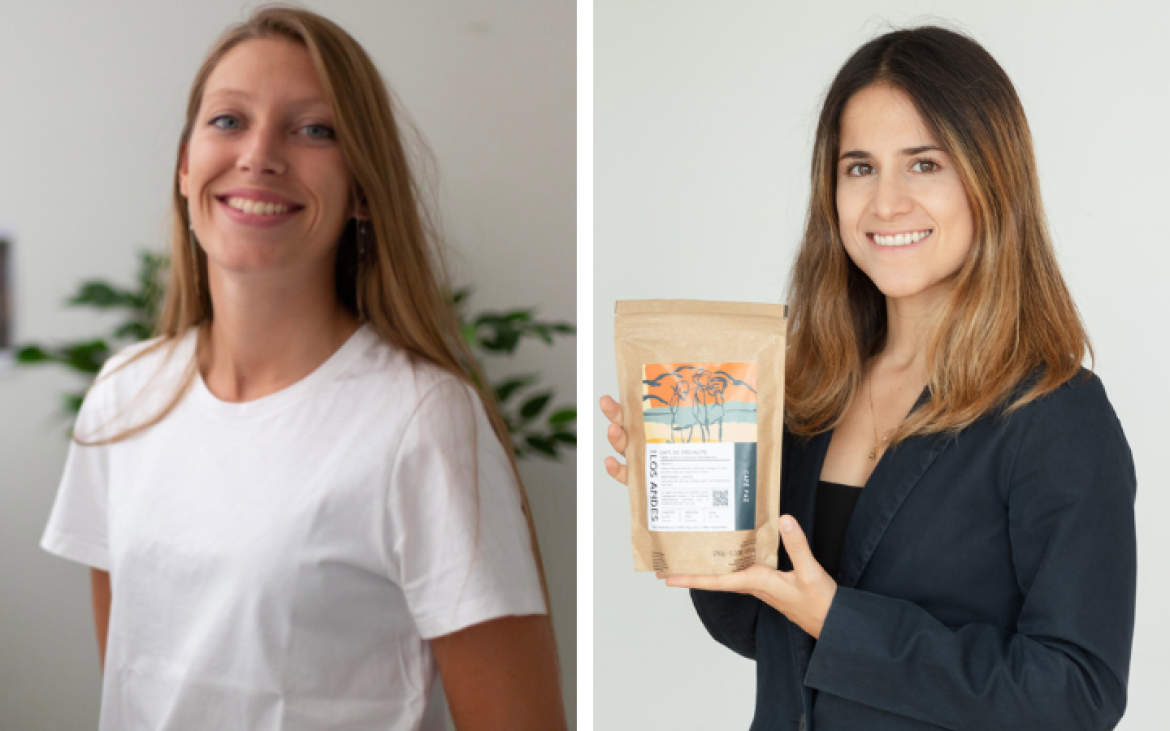
If you’re looking to get into the food industry, first you need to understand and take on board the industry’s market-specific rules. A point on which nothing beats the feedback from graduates who have experienced and managed similar activities. An overview of some of their valuable lessons learned.
The agri-business world has always appealed to Katia, founder of the Paris-based company BAM&Co in 2019. Her challenge: to provide organic, made-in-France products for breakfast, mid-afternoon snacks and pre-dinner nibbles, that are delicious, natural and healthy, to be sold in supermarkets, hypermarkets, delicatessens and organic stores.
Get into complementary goods
“This is a highly competitive and regulated sector. When launching a career in this field, you have to be passionate about it. It’s imperative you ask yourself the serious question of why you wish to get into this market. You need to offer an alternative or complementary product that’s different to what’s already out there, and find an identity and a product innovation, so as to create added value. Moreover, remember you can work in food without having a good palate.”
Be resilient and get yourself some good support
“It’s a marathon, not a sprint. You need endurance and, as this is a multifaceted profession, you should also master production, logistics, trade and so forth. It’s equally crucial to have a good support network around you, for guidance along the lonely road of entrepreneurship and to help you make the right choices at the right time and when thinking through the processes, etc. As I’ve done myself, it’s possible to get a helping hand from CCIs or incubators like Food Val de Loire.”
Assess the feasibility of your project
“It’s a mistake to launch a project without having invested adequate time in the planning. It took me a year and a half. For instance, when launching a new recipe, you have to think about the whole chain, including the packaging and logistics, and be equipped with some engineering data.”

For the past year, he has been Sector Manager at Timac Agro International in Saint-Malo, a company specialised in delivering agricultural solutions for fertilisation processes. He is tasked with building agri-industrial partnerships so as to provide their farming suppliers with suitable fertilisation plans.
Stay curious
“You have to have an inquiring mind and a good understanding of each link that goes to make up this sector’s chain. You also need a good grasp of the future stakes at play and also be particularly eco-conscious. Finally, good interpersonal skills are a must.”
Be very responsive
“This is a shifting market, as is large-scale distribution in particular. Consequently, you need to be very responsive, with a flair for detecting future trends. We also operate in a highly volatile market, so there again you need to be proactive.”
Master your subject
“In my own field, you also have to be technical and across your subject. Therefore, it’s important to be very clear and attentive to your end customers so you can provide pertinent advice.”
After acquiring a taste for authenticity in France and eager to test out new savours and share them with others, in 2020 she founded Café Los Andes in Paris, with the idea of popularising speciality coffee among the general public. Her products, sold via e-commerce, B2B and on markets, are from Columbia, her country of origin. She is planning to open several outlets in Paris, with a view to offering tasting sessions.
Know your market
“Conducting a market study is fundamental. Similarly, don’t base things on your own tastes but rather seek out a product that has real consumer appeal. Hence the importance of real-world input that you can get from markets, tastings, etc. Know how to speak about your product, or else think about offering a real taste experience.”
Surround yourself with the right people
“You need to be aware of the importance of having a great team.”
Choose to have totally transparent information
“It’s important to ensure a certain degree of traceability. A simple QR code on packaging allows you to communicate as much information as you wish regarding the contents and the origin of the product.”

Florence Falvy, Editor
Upcoming events
- Tuesday 10: galette des Rois - Paris
- Saturday 14: guided visit "Atelier Chana Orloff" - Paris
- Saturday 14: Chinese New Year celebration - Paris
- Monday 16 to Friday 20: EU Lab Winterschool 2023 - Nantes
- Wednesday 18: webinar #NégoTraining (only for women)
- Friday 20: Chinese New Year celebration - Nantes
- Tuesday 24: meeting Club Marketing & Digital - Paris
- Friday 27: breakfast & visit to the Valae company - Le Mans
- Friday 27: annual meeting "Faire et refaire la ville" REALITES-Audencia Chair - Nantes
- Monday 30: afterwork "galette des rois" - Nantes
- Wednesday 01: expert webinar Achat & Supply Chain
- Friday 03 to Saturday 04: graduation ceremony class of 2022 - Zénith, Nantes
- Saturday 04: guided visit "Bibliothèque nationale de France | site Richelieu" - Paris
- Tuesday 07: conference "Sport & Seconde main" - Paris
- Wednesday 08: conference INSPIRE #4 (more information on Together)
- Tuesday 21: workshop #NégoTraining (only for women) - Nantes
- Tuesday 07: [save the date] webinar with the Global and Multi-Capital Performance Chair
- Wednesday 08: conference INSPIRE #5 (more information on Together)
- Tuesday 14: programme anniversary - MS MASC & MCI - Nantes
- Tuesday 14: [save the date] conference on women leaders, with the Positif Impact Chair - Nantes
- Thursday 30: webinar #NégoTraining (only for women)
Recent publications
Find out about the latest publications from across your Audencia network:
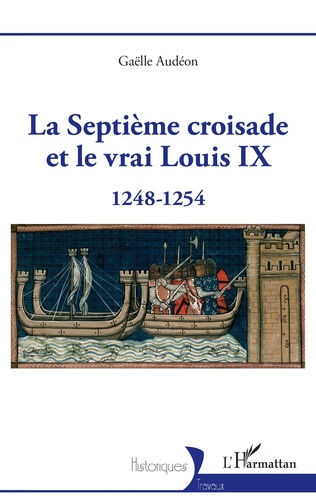
“La Septième Croisade et le Vrai Louis IX - 1248-1254” (“The Seventh Crusade and the Real Louis IX - 1248-1254”)
King Louis IX led two crusades that were both bitter and resounding failures. That of Egypt 1248, accompanied by his spouse Marguerite of Provence, kept him away from France for six long years. In this study, Gaëlle Audéon reveals the immature behaviour of Louis IX, his absurd decision-making and religious fanaticism, that made him a sovereign of mediocre intelligence, with little concern for his kingdom, as well as an odious husband and an autocratic patriarch. This publication puts a new spin on historical sources, for a calling into question of this “great king” and “great man”.
Gaëlle Audeon (Exec MBA 11) - L’Harmattan French Publisher
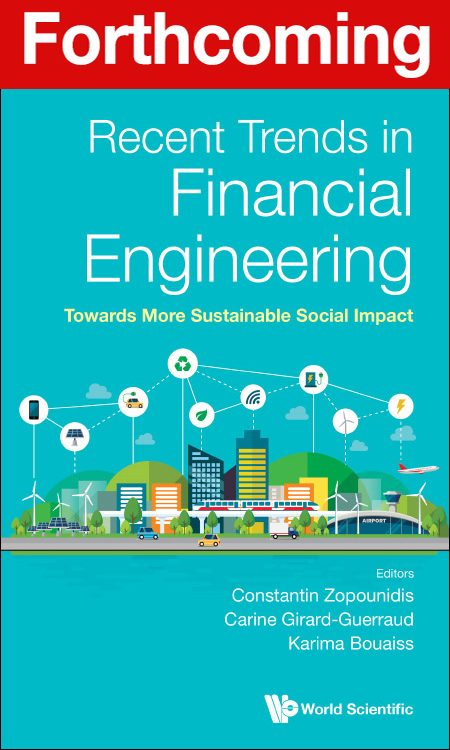
“Recent Trends in Financial Engineering. Towards More Sustainable/Social Impact”
A collection of cutting-edge approaches in financial engineering. This book is especially helpful to new researchers and practitioners working in this sector, enabling them to quickly grasp the current state of affairs in financial engineering. This work provides readers with a comprehensive understanding of technological issues and financial innovations with regard to the environmental and social domains.
Karima Bouaiss, Carine Girard-Guerraud (Professor at Audencia) and Constantin Zopounidis - Edition World Scientific Publishing
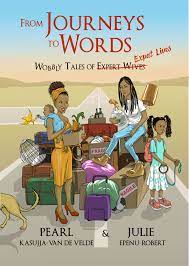
“FROM JOURNEYS TO WORDS. Wobbly Tales of Expat Lives”
Expat life is such a unique experience. This book gives a glimpse of that life to those who haven't lived it while for those who have, it's a relatable dose of nostalgia. It's a great read for anyone curious about life beyond the borders of their own country.
Juliet Epenu (MBA 13) - Edition Mahiri books

“Pénouche” (Comic Strip)
“Life is like a 4-finger Kit Kat®. That first finger bar of mine was covered with innocence…” A 25-year-old Pénouche lives in Paris and has no updated CV, no fella, rent to pay and boundless energy. Pénouche’s thing is talking about things and shooting the breeze. Yet, here’s the rub; talking about things was never really a job… So, while she waits to land her dream job or find that perfect guy, Pénouche tumbles from one crisis and gaffe into the next unlikely situation. Then, when things get too overwhelming...
Pénélope Bœuf (GE 07) - Published by Editions Nathan
Séverine Richou, on behalf of the Audencia Alumni Team
New appointments
.jpg)
A number of our Audencia alumni have changed post in recent months. Congratulations to each and every one of them on these wonderful new appointments:
Jesus Abia Arias (EIBM 09) has been appointed General Manager Europe at Prada - Valentino - Mugler - V&R
Florian Brejon (MOS 17) has been appointed Associate Director-General in charge of news at News Tank Football / News Tank Sport
François Cardi (GE 14) has been appointed Executive Director at Goldman Sachs
Benjamin Compère (GE 10) has been appointed Consulting Partner at KPMG France
Luc Dammann (GE 93) has been appointed President EMEA at Adobe France
Charles Dubos (GE 15) has been appointed Brand Director at IWC Schaffhausen for the Netherlands and the Nordics
Emmanuel Dupeux (GE 04) has been appointed Global Board Director at Russell Bedford International
Marie-Céline Faivre (ISMA 98) has been appointed Industrial Site Director at Cofel
Michel Galeron (ABM 14) has been appointed West Europe Manager Unilever International at Unilever
Fabrice Guérin (GE 99) has been appointed Marketing Director at Syfadis (Orians Group)
Olivier Kempf (GE 98) has been appointed Director of Marketing & Customer Experience at Emil Frey France
Serge Laverdure (Exec MBA 07) has been appointed Managing Director Lacroix Impulse at Groupe Lacroix
Florian Leginy (GE 17) has been appointed Vice President at Largillière Finance
Antoine Le Touzé (GE 05) has been appointed M&A and Tax Director at Icade (Caisse des dépôts Group)
Sophie Merlet (GE 05) has been appointed Partner within the Real Estate, Fiscal and International Divisions at Parthema Avocats (Law Firm)
Catherine Meunier-Miconnet (GE 99) has been appointed Director of Professional Banking, La Banque Postale (Groupe Caisse des dépôts)
Alexis Ravalais (GE 11) has been appointed CEO of Rallye (Groupe Casino)
Antoine Riboulon (GE 15) has been appointed Staff Analyst – Energy Markets at Tesla
Claire Vernet-Garnier (GE 08) has been appointed Director Asset Management at InfraVia Capital Partners (Aéma Group)
Mickaël Vinet (GE 00) has been appointed France Deputy General Manager at The Coca-Cola Company
Matthieu Vonthron (GE 05) has been appointed Senior Manager at Deloitte
Fellow Audencians have launched their own business venture over recent months:
Laurie Aufschneider (SciencesCom 13) is Co-founder of August Architecture
Gary Benezat (GE 15) is Co-Founder of Dans les coulisses du Web3 (Behind the scenes of Web3)
Josselin Bihan (GE 21) is Founder of Toucher l'Horizon
Soumiya Brandon (TITLE 1 Human Resources Director 2017) is Director & Founder of Reveal-RH
Charlotte Coatanea (GE 21) is Co-founder of Jermène
Henri de Lorgeril (GE 14) is Co-founder & CEO of Studio Ajour
Yves Le Gohebel (Exec MBA 08) is Partner & Co-founder of Crepizz
Théo Malarde (MASC 14) is Entrepreneur (Web3.0, Blockchain, and Crypto)
Marie Sabatier (GE 20) is Co-founder of Le Bar à Pains
We wish them all the very best for continued success in their professional life!
If you too are changing post or setting up your own business venture, we’d love to hear about it. Please drop us a line here at audenciaalumni@audencia.com

Séverine Richou, on behalf of the Audencia Alumni team
Closing remarks
Many thanks for taking the time to read this 22nd edition of The Mag! We sincerely hope this issue featuring some great alumni stories has inspired you.
Our heartfelt thanks to all those who kindly agreed to recount their own stories in this issue, sharing with us their visions for and involvement in the agri-food industry!
We look forward to seeing you back here in March for your 23rd edition of The Mag.
In the meantime, and for further details on all the latest news across your network, join us and find out about our upcoming events and times of sharing by heading over to Together and our LinkedIn Audencia Alumni page.
Throughout the year, these Mag issues have enabled you to re(discover) all the events that have marked 2022. A special thanks to all our alumni and internal and external actors of the school who have contributed to making such a success of these events that have allowed us all to meet up. So, with 2023 promising to once again be a year full of get-togethers and times of sharing, we’re very much looking forward to seeing you then!
Any ideas or suggestions regarding The Mag? If so, then feel free to drop us a line here at audenciaalumni@audencia.com.
Your Alumni team wishes you all a wonderful year ahead.
Be seeing you real soon!
Share
More info on Together
More emags
- The M@g : Le magazine d'Audencia Alumni, #22 - Janvier 2023 - 22#
- The M@g : Audencia's Alumni Magazine, #21 - September 2022 - 21#
- The M@g : Audencia's Alumni Magazine, #20 - June 2022 - #20
- The M@g : Audencia's Alumni Magazine, #19 - April 2022 - #19
- The M@g : Audencia's Alumni Magazine, #18 - December 2021 - 18#
- The M@g : Audencia's Alumni Magazine, #17 - June 2021 - 17#
- The M@g : Audencia's Alumni Magazine, #16 - March 2021 - 16#
- The M@g : Audencia's Alumni Magazine, #15 - December 2020 - 15#
- The M@g : Audencia's Alumni Magazine, #14 - September 2020 - 14#
- The M@g : Audencia's Alumni Magazine, #13 - May 2020 - 13#
- The M@g : Audencia's Alumni Magazine, #12 - February 2020 - 12#
- The M@g : Audencia's Alumni Magazine, #11 - December 2019 - 11#
- The M@g : Audencia's Alumni Magazine, #10 - October 2019 - 10#
- The M@g : Audencia's Alumni Magazine, #9 - July 2019 - 9#
- The M@g : Audencia's Alumni Magazine, #8 - May 2019 - 8#
- The M@g : Audencia's Alumni Magazine, #7 - April 2019 - 7#
- The M@g : Audencia's Alumni Magazine, #6 - January 2019 - 6#
- The M@g : Audencia's Alumni Magazine, #5 - November 2018 - 5#
- The M@g : Audencia's Alumni Magazine, #4 - September 2018 - 4#
- The M@g : Audencia's Alumni Magazine, #3 - July 2018 - 3#
- The M@g : Audencia's Alumni Magazine, #2 - May 2018 - 2#
- The M@g : Audencia's Alumni Magazine, #1 - March 2018 - #1



